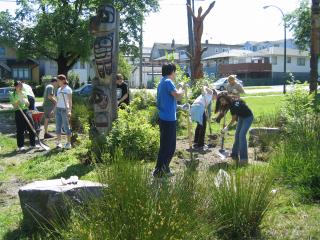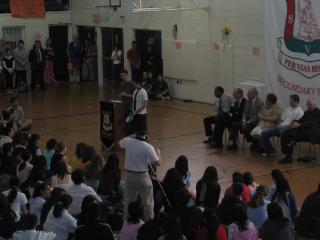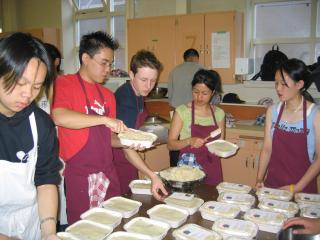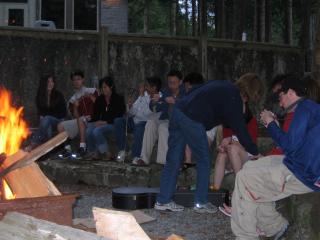|
|
My Metaphor: CELEBRATIONS and SURPRISES My Masters experience has been a wonderful party that I gave to me!
Yes, I do feel that I have been very self-indulgent during these three
years, as I have prioritized my life around completing this program.
Like any special party, I took some time to plan a theme and to decide
who I would invite. Then, as the guests, ie. the instructors,
their courses and my classmates, arrived at my party I had an
opportunity to engage in stimulating conversations. These conversations
hinted at the gifts which I would receive, and centred around the theme
of my party: how to support the social, emotional, and cognitive needs
of highly able secondary students. I received many special gifts, each
one in some way developing my theme. These were the assignments which
required readings, research, and reflection. Some of these gifts were
utilitarian in nature, and others were delightful surprises. My most
treasured gift, my field experience, is proving to be even more
precious than I had anticipated.
|
|
|
Artifact: An Introduction to the Needs of Gifted Learners In
the Department of Educational Psychology and Special Education, there
are very few of us who are focusing on Gifted Education. The majority
of students are studying other special needs such as autism and other
behaviour disorders, or the education of the vision or hearing
impaired. I have sometimes felt that it was important for me to defend
the needs of gifted learners. The following link goes to a presentation
which I gave in EPSE 512, "In Defense of Funding for Gifted Education".
It provides a useful overview of some of the misconceptions regarding
the needs of gifted learners. I
also shared it with our principal two years ago, when funding for our
enrichment programs was threatened. My intention in sharing it with him
was to provide him with a response to some of the arguments being made
by our trustees to justify their position. They eventually rescinded
their decision to cut our funding.
In Defense of Funding for Gifted Education
|
|
|
Artifact: Further Investigations into the Social and Emotional Needs of Gifted Learners Gifted
learners often deal with issues of high expectations, both from within
themselves and by the people around them. Two of my reflections delved
into some of the consequences of these pressures: perfectionism, and
the Big-Fish-Little-Pond-Effect. These reflections can be found at the
following links:
Perfectionism and Extremely Able Students
The Big-Fish-Little-Pond-Effect
|
|
|
Artifact: Motivation and the International Baccalaureate Programme I
was very eager to learn why some students choose to take on the
challenge and associated additional workload of any enriched program,
and particularly the International Baccalaureate Programme. EPSE 584:
Motivation in Education provided the opportunity to investigate the
issues of motivation, and my paper, "Motivation of Gifted and Talented
Sudents, High-Stakes Educational Programs, and Life-Long Learning", was
my attempt at synthesizing these ideas.
Motivation of Gifted and Talented Students
|
|

Community Day clean-up of local garden
|
|
|
|
|
My Goals During
my Masters of Education Program I have investigated the social,
emotional, and cognitive needs of highly able secondary students. I
have a special interest in questions surrounding the suitablity of the
International Baccalaureate Programme for meeting those needs.
|
|

Students welcome our special guests to Community Day
|
A HUGE SURPRISE!!! Artifact: Community Day Continuing
my quest for information regarding the social and emotional needs of
highly able students, I registered for EPSE 585: "Social-emotional
Development in Education" in the summer of 2004. In May, 2004 our
instructor, Dr. Kim Schonert-Reichl had addressed the staff at the
school where I teach. At that time, she witnessed the final
preparations for our first ever school-wide volunteer day, which we
called "Community Give-Back Day." A detailed description of the day can
be found at the link below. During
the three weeks of EPSE 585, Dr. Schonert-Reichl often referred to our
Community Day as an excellent example of the type of project a school
could undertake to address an array of the social and emotional needs
of students. She also suggested that for my final project, I could
write a paper about Community Day. It was a very easy paper for me to
write, almost too easy, and I did feel rather guilty that although I
had not put a disproportionate amount of effort into the day itself, I
was now reaping great rewards through the paper that I had written. However,
that all changed when, in the early spring of 2005, I was asked to lead
our school through a second Community Day to be held in May of 2005. I
have never before put myself into a position such as this, where so
many people were depending on me to lead them through such a public
event. To fail would have been tremendously humiliating, but here was
an opportunity to follow through on what I had learned the previous
summer. It was clearly a situation where I was challenged to put theory
into practice. Of
course, I did NOT do this alone - far from it!!! I shared the task with
a tremendous committee of students, and with Mr. Harapnuick, who had
initiated the event the previous year. As usual, every member of our
staff and support staff, as well as the entire student body pulled
together, to problem-solve where necessary to make our second Community
Day, like our first, a huge success. Nevertheless, if no one had agreed
to take up the challenge it would not have happened this year. I was
honoured to have played a role in facilitating this event. I
would never have imagined myself agreeing to such a task, and had it
not been for EPSE 585, I likely would not have done so. However, it was
tremendously rewarding for me on so many levels, and I feel such a
sense of accomplishment. For me, this was the most surprising outcome
of my Masters program.
Community Day
|
|

Students prepare '100 Meals for the Homeless' during Community Day
|
|
|
|
|
Special Interest Having
been involved in various aspect of the International Baccalaureate
Programme (IB) for 15 years, I was particularly interested in delving
into the following 3 questions throughout my Masters Program: 1.
Is the IB Programme a suitable academic programme to offer capable
secondary students? That is, does the IB provide a suitably enriched
curriculum that challenges students academically? 2.
What is the psychological and emotional impact of the IB Programme on
its students? Is the level of stress that students in this programme
experience too intense? 3.
Are IB students better prepared to meet the challenges of
post-secondary study, and is this evident in the long-term career
outcomes of these students? In other words, is the pressure and
sacrifices that IB students experience really worth the final outcome?
|
|
|
A PLEASANT SURPRISE! Artifact: Curriculum Compacting My
final assignment for EPSE 516: "Seminar in the Development and
Education of Gifted Learners", was a presentation that I prepared with
the intention of persuading our staff that we should consider
compacting our junior enriched science program. I was pleasantly
surprised when my suggestions were accepted. In addition, the math
department followed our lead and undertook a similar adjustment of the
junior enriched math curriculum! The link below connects to the full presentation.
Curriculum Compacting
|
|
|
THE GIFT I WAS REALLY HOPING FOR!!! Artifact: Field Experience As
I indicated at the top of this column, my special interest has to do
with emotional and cognitive needs of students in the International
Baccalaureate Programme. Those three questions (above) guided my survey
of IB graduates, as I sought their restrospective opinions of the IB
Programme. The links below connect to the results of the survey, and to
histograms of those results. This
was the gift to which I was most looking forward. I wanted answers to
these questions from the graduates themselves, and I have been unable
to find any such information in the literature. There is a great deal
of interest in the IB Programme as it continues to experience rapid
expansion worldwide. It is important, therefore, that we gather
information from a variety of sources about the suitability of this
program for highly able secondary students. Surely one of those sources
should be the students themselves. I
am only now beginning to appreciate just what a treasure my field
experience is. I plan to write a paper about the results of my survey,
and I hope to one day see it published! In my opinion this will truly
be the most exciting gift of all the wonderful experiences that I have
enjoyed throughout my M. Ed. Program.
Survey Results
Tables of Results
|
|

Friends relaxing after IB exams
|
|
|
|